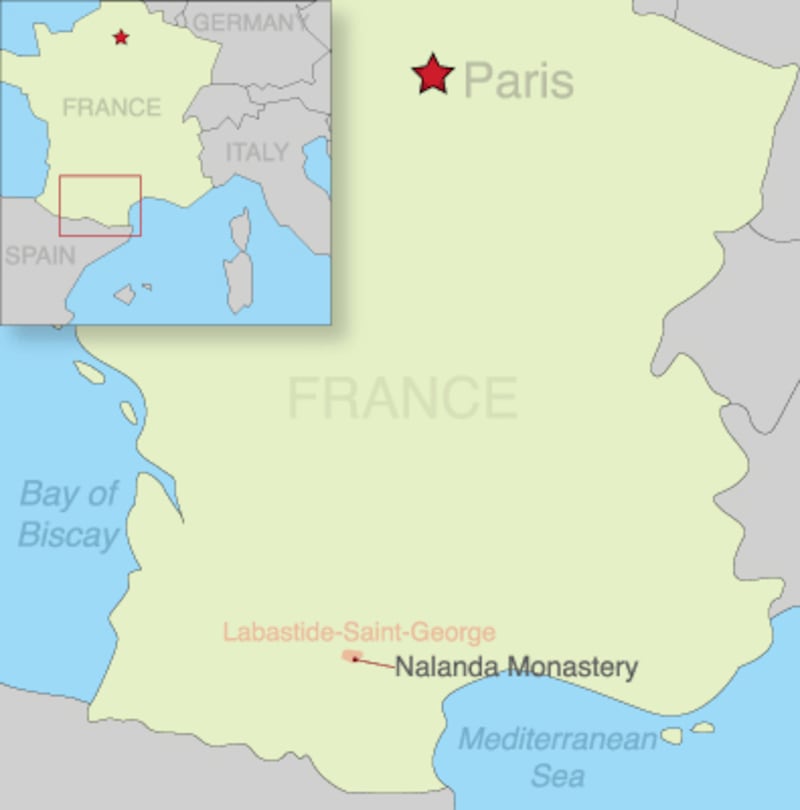A British monk set himself on fire and died at a Tibetan Buddhist monastery in France on Thursday amid suspicion by police that he may have been making a "political gesture" against China's occupation of Tibet, according to sources and reports.
The 38-year-old monk, a native Briton but known by the Tibetan name Donden, doused himself with gasoline and set himself ablaze at Nalanda monastery in southwest France, a U.S.-based Tibetan monk told RFA’s Tibetan service on Thursday, citing sources at the monastery and speaking on condition of anonymity.
Nalanda, located near the village of Labastide-Saint-George, is a "unique" Western monastery in the Tibetan Buddhist Gelukpa tradition, according to the monastery's web site.
Reached by phone on Friday, a monastery spokesman declined to comment.
“An inquiry has been launched by the local French authorities, so we cannot comment on anything until the inquiry is completed,” he told RFA.
Exile Tibetan media quoted officials at the monastery, which is home to 25 monks and 20 lay people, as saying that Donden had left no note or statement explaining his act.
Motive unclear

Police were seeking to establish whether the victim had been depressed or if he might have committed suicide in an act of solidarity with Tibetan protesters in China, Agence France-Presse reported.
A French police officer told Britain's Daily Mail newspaper that the monk may have been making a "political gesture' questioning Chinese rule in Tibet.
"The man appears to have poured petrol over his head and clothes and set himself on fire,” Gendarmerie colonel Pierre Bouquin told the newspaper.
“He was discovered a few minutes later by other monks in a garden at the monastery, Bouquin said.
“We believe he may have been making a political gesture related to Tibet, but an investigation will be carried out to establish the full facts."
Firefighters and police were called to the scene but were unable to save the monk's life, according to the report.
'Urgent, grave' situation
In Tibetan regions of China, 74 Tibetans have set themselves on fire in a challenge to Chinese rule since the wave of fiery protests began in February 2009.
On Thursday, two young Tibetans burned themselves to death in restive Rebgong (in Chinese, Tongren) county in Qinghai province, where authorities have cut communications to prevent news of self-immolations from reaching outside areas.
The rising number of self-immolations has triggered concerns at the Central Tibetan Administration (CTA), the Tibetan exile government in Dharamsala, India, which has urged the United States to push China's new leaders to restore the rights of Tibetans.
On Friday, more than 200 members of Tibet Support Groups from across the world began a three-day meeting to strengthen efforts to deal with the "urgent and grave" situation in Tibet, the CTA said on its website.
Lobsang Sangay, the CTA head, said the meeting will send a “strong message” of the international community’s solidarity with Tibetans inside Tibet, calling the talks “historic and extremely important.”
“It will send a clear message to Beijing that Tibetan supporters will make sure that the Tibet issue remain alive till freedom is restored in Tibet and His Holiness the Dalai Lama returns to Tibet,” said Sangay, the political successor to exiled spiritual leader the Dalai Lama, who lives in Dharamsala.
According to the CTA website, Sangay said, “The meeting also sends a message that Tibetans in Tibet are suffering torture on a daily basis and denied basic human rights."
"But they are sacrificing their lives in the belief that Tibetans in exile and supporters will stand up for them to realize their aspirations for freedom and His Holiness the Dalai Lama’s return to Tibet.”
Reported by Kalden Lodoe for RFA's Tibetan service. Written in English by Richard Finney and Parameswaran Ponnudurai.
